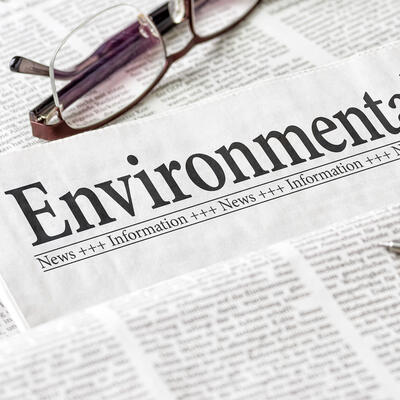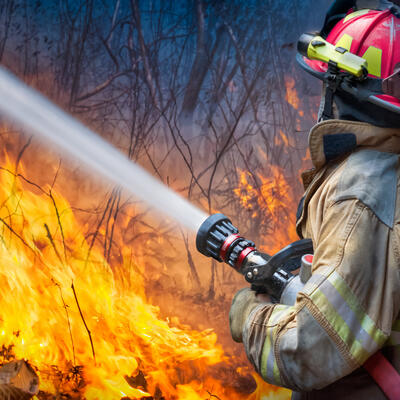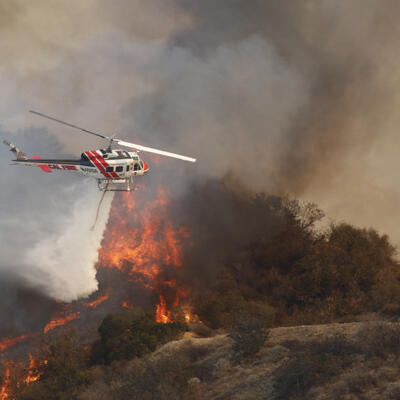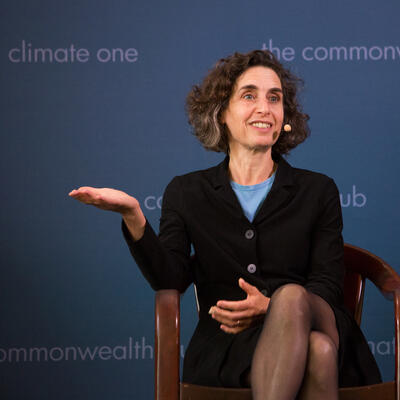
Elizabeth Kolbert and David Roberts: Covering Catastrophe
Guests
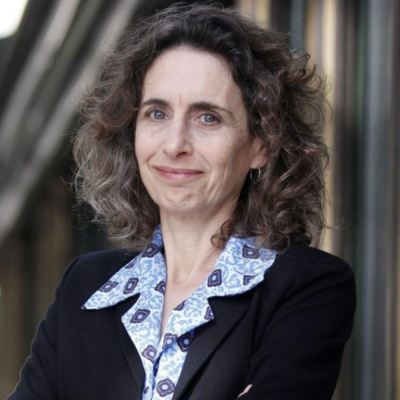
Elizabeth Kolbert
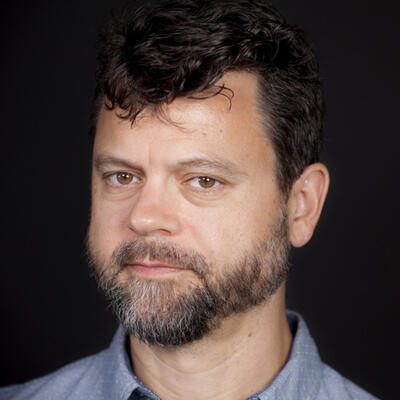
David Roberts
Summary
Communicating about climate change and convincing the public that something needs to be done about it is a complicated proposition, one that reporters Elizabeth Kolbert and David Roberts face daily in their jobs of covering the looming catastrophe.
Music courtesy: Harbor by Kai Engle
Full Transcript
Announcer: This is Climate One, changing the conversation about energy, economy and the environment.
For writers and reporters who cover the climate change beat, getting to the story can be a challenge.
Elizabeth Kolbert: In some level it’s the worst story ever. It is ubiquitous, but very hard to pin down. It's caused by everyone and everything. And therefore it’s sort of everything and nothing and so finding the narrative is very, very difficult.
Announcer: So what can journalists do to get the story out there?
David Roberts: My goal was always to speak to the political junkies and the nerds and the news obsessives and bloggers and twitterers and all those people about this in a way that reaches them and that they understand.
Announcer: Covering Catastrophe. Up next on Climate One.
Announcer: What’s it like to write about climate change in a post-truth world? Welcome to Climate One – changing the conversation about America’s energy, economy and environment. I’m Devon Strolovitch. Climate One conversations – with oil companies and environmentalists, Republicans and Democrats – are recorded before a live audience, and hosted by Greg Dalton.
On today’s show, we’ll hear two veteran climate reporters talk about their personal stories, media coverage of climate, and how people respond to the massive evidence that the climate is changing in their lifetime, and in their hometowns. Elizabeth Kolbert's 2006 book Field Notes from a Catastrophe was instrumental in creating and shaping Climate One. Her 2014 book,The Sixth Extinction: An Unnatural History won a Pulitzer Prize, and she continues to cover climate and other stories for The New Yorker. David Roberts earned a wide following covering climate for Grist. He eventually got so burned out that he walked away from the climate beat for a time, but he’s back now writing some of the most incisive climate articles anywhere for Vox.
Here’s our conversation about covering catastrophe.
Greg Dalton: Elizabeth, let’s begin after the 2000 election, George W. Bush pulled the U.S. out of the Kyoto climate accord. You went to Greenland for the first time to learn how that might impact. And then you went to David Remnick, then the new editor of The New Yorker to pitch him on the stories that -- yeah pick it up there.
Elizabeth Kolbert: Well, yeah after George Bush was elected, if people can think back to that moment it was still known where a lot of stories you read about climate were sort of he said, she said kind of stories and it seemed like I was naive at that point and it seemed like there ought to be an answer to this question who’s saying, you know, what's true and I should really go find it out. And so that's how this whole journey to the Arctic and beyond began.
Greg Dalton: And then those stories became Field Notes from a Catastrophe. And you are at that point kind of laying out still fairly early days, it was before a lot of -- before An Inconvenient Truth, before a lot of people had awakened to climate and you are looking about what signs in the natural world that hey, this is happening?
Elizabeth Kolbert: Yeah, this is like 2000 by the time I really did a lot of the reporting for that book for this series that ran in The New Yorker, it was 2004. And I was right at the moment in fact the American Geophysical Union had just come out and said there’s sort of, I can’t remember the exact word but there's unequivocal evidence of climate change right now the signal emerging from the noise. So it was just at that moment where the scientific community. There are a lot of, you know, people on this crazy idea that the scientific community, you know, just all jumped on this bandwagon, absolutely not. People are really, really a lot of scientists were very hesitant to say, you know, show me the evidence. But right around that moment in 2003, 2004 a lot of these data sets began to show very clear signs of climate change. And so a lot of the scientific organizations came out with pretty important statements at that point we all know now, in retrospect, how much good that did.
Greg Dalton: And what did you see actually up there in Greenland that was sort of like what made you gasp?
Elizabeth Kolbert: Well one of the things I did in that particular moment is I went to a station and it had been set up as a weather station on the top of the ice sheet. So you’re standing on 10,000 feet of ice basically. And they talked about how the ice had changed and how they had to be there earlier and earlier in the season now because actually it was melting out so badly it was getting really dangerous. And in fact when I was there, you know, you could see these rivers forming on the top of the ice sheet and it was getting pretty dangerous. So it was very vivid example of a very, very dramatic change.
Greg Dalton: David Roberts around that time, 2003 you are not in Greenland, you were unemployed in adrift in your life. So pick up your story there.
David Roberts: [Laughing]. That’s much less romantic story than Elizabeth. Yeah, I had a philosophy masters and half of a philosophy PhD and I had bailed out of school in academia and didn’t know what the heck I was doing with my life. And saw a Craigslist ad for an editorial assistant at a small web publication called Grist which at the time had four, I think full-time employees. And so I wrote a cover letter and said, “Hey, I have no experience in journalism. No particular interest or experience in environmentalism. However, I really want this job.” and wrote a grammatically correct cover letter which apparently is a rarity and got hired at Grist. Started in 2004 and was mostly doing editorial stuff and writing news blurbs back when that was the thing. And so just wormed my way very slowly but surely from the editorial side over into writing eventually full-time. It was sort of I’d say journalistically I was raised by wolves there were no, I was basically just on my own. So everything I learned about the subject matter and everything I learned about journalism, I learned on the fly on my own during those years. And here's one funny anecdote. It was around 2004, 2005 I started writing full-time to 2006, I decided well okay, I wanna be a writer, I wanna be a journalist which means like journalists interview people, right. So the very first professional interview I ever did in my journalistic career was Elizabeth Kolbert in the wake of her book back in 2006, 11 years ago now.
Greg Dalton: And did you know he was an untrained hack?
[Laughter]
David Roberts: I’m sure she knew by the end of it.
Elizabeth Kolbert: I was gonna say I think David doesn’t realize all journalists learn on the fly, yeah, I hate to disappoint him, right.
Greg Dalton: Elizabeth, you say that one of the challenges of the climate story is the absence of many colorful characters. Why is that?
Elizabeth Kolbert: Well, I mean climate change is, on some level it’s the worst story ever. It is ubiquitous, but very hard to pin down. It's being caused by everyone and everything. And therefore it’s sort of everything and nothing and so finding the narrative is very, very difficult. And unfortunately, I would say, and this is journalistically good and for the civilization very bad is becoming easier and easier. You know, it’s becoming easier and easier to go places and have people say this is climate change we’re looking at it, we’re experiencing it. So from a journalistic perspective actually, just in the, you know, 12, 13 years that I've been doing this that part of it has really changed.
Greg Dalton: But there are oil companies there aren’t any good villains or is it there’s a lack of a villain with an intent to inflict harm. Even people who are burning fossil fuels think they’re providing jobs. Is that the people who are doing solutions are kind of boring in process and not very sexy if you're doing something?
Elizabeth Kolbert: Well, I mean it’s all of the above and certainly there are villainous people and you know I can name names if you want.
Greg Dalton: Just one, one or two.
Elizabeth Kolbert: James Inhofe, you know, I mean they're well known, you know, sort of, you know, deniers and there was, you know, the long Exxon Mobil campaign and there is The Heartland Institute. But, you know, they’re just people sort of putting out, you know, falsehoods or propaganda or whatever. They're not even, some of them are pretty smooth characters too. But, you know, fundamentally I think that the problem is, even as bad as some people are and as misleading as some people are, you know, that we all put gas in our cars. So even if Exxon Mobil is, you know, fostering a lot of misinformation which they certainly have, you know, there's a lot of soul-searching that we all have to do. And so it's not enough even to say that there’s a villain, you know, it’s just definitely one of the situations where we've met the enemy and he is us.
Greg Dalton: We’re all complicit and that's hard to deal with. Mark Hertsgaard is a journalist who believes that many of his colleagues are too concerned about reaction. He wrote an article for The Nation. Let's listen.
[Start Clip]
Mark Hertsgaard: I think that too many journalists, especially journalists inside of Washington DC worry way too much about what kind of push back they’re going to get from either their viewers or listeners or readers and the politicians. We have to follow the facts. Look at the coverage of Hurricane Harvey and Hurricane Irma especially on television on the networks. ABC and NBC went an entire week of coverage without once mentioning climate change, without once pointing out that these storms are getting stronger because of climate change. That's what the science says. That is irresponsible journalism because we have been warned about exactly these kinds of extreme weather events. My last piece for the nation where I said that this is murder it amounts to premeditated murder. And we, as a society need to punish it as such or we encourage more of it. Those are strong words. I would not have used those words in 1992, or even 2002. But now after watching disaster after disaster after disaster and above all seeing how the climate deniers in Washington and in the big corporate enterprises of this country are continuing to block action. I think that the phrase premeditated murder is entirely accurate.
[End Clip]
Greg Dalton: Journalist Mark Hertsgaard. David Roberts, your reaction.
David Roberts: I get it. I get there's a cycle people go through in the struggle with climate change were they sort of the immensity of it dawns on you in kind of stages. And at each new stage, you’re like, damn, damn, and you just want to like, you know, escalate. And there's journalists now who get caught in the cycle who just like it's even worse than that it’s even worse just like looking for these new metaphors escalating and escalating. But for me, like I escalate and I escalate, you know, get as high as I can and then I got to get up the next day and write more you know what I mean. So at a certain point you have to find an equilibrium you have to find a way to operate on a day-to-day level. You can't just like be in this continually escalating sense of, you know, what I mean. I don’t know if I’m articulating that well but like I've done that, I've gone through the cycle of escalating, escalating, escalating rhetoric and then like in order to go from there then you got to get up the next day and write more, you know. So and also my sense approaching the subject is that there's sort of cultural and political news and then there's environmental news in this weird satellite more or less ignored by the planet. But the two are not very connected. And so my goal was always to speak to the political junkies and the nerds in the news, you know, the news obsessives and bloggers and twitterers and all those speak to those people about this in a way that reaches them and that they understand. And if you just are pounding the table about how this is a crisis and we’re all going to die, even if it's true, you get slotted into a mental bucket of the people pounding the table. And like once you've heard someone pound the table once, you don’t really need to go back and hear him pound the table again, you know, like the table is pounded like we get it, you know. So I want to be read on a day-to-day level. So the point is I'm trying to bridge those two worlds in terms of language in terms of concerns in terms of people. That's always been what I’ve been trying to do and you can't do that if you just follow this escalation.
Announcer: You’re listening to a Climate One conversation about covering catastrophe and the climate beat. You can subscribe to our podcast at our website: climateone.org. Greg Dalton will continue his conversation in just a moment.
Announcer: We continue now with Climate One. Greg Dalton is talking about covering catastrophe with veteran climate reporters Elizabeth Kolbert, who writes for The New Yorker, and David Roberts, a staff writer at Vox.
Here’s your host, Greg Dalton.
Greg Dalton: Elizabeth Kolbert, when you write a piece first of all you have to sell it to your editors. But are you thinking about informing people, telling a good story. Do you want to inspire action. Do you think about the impact of your stories and what people will do with the information you give them?
Elizabeth Kolbert: You know of course you think about it, but I do want to be honest and say that's not my job in a way. And if journalists went around always thinking about what impact, you know, I come out of a newspaper background I worked at the New York Times for a long time. And, you know, our job is really tell it like it is that was our job. And I still really adhere to that, I'm sort of an old-fashioned journalist in that. And I think that telling it like it is and sort of people can do with this information what they will that's still the role of journalism, even as journalism becomes more and more partisan and more and more, you know, tribal. I guess I still believe in something, something called that we used to call the truth, you know, and I try to follow that. And I can't really know how it’s gonna impact people think of, you know, you might have you would hope you'd have, you know, a million readers. I have no idea how many people are gonna react. So if you are always thinking about that, you’re not gonna take the first step.
Greg Dalton: So you’re not trying to solve the problem.
Elizabeth Kolbert: I don’t, that’s way above my pay grade solving this problem. Yeah, I am trying to give people information that I hope, you know, I do hope on some level inspire people, you know, to think about it at the very least. And I hope certain number of them will be inspired to do something. But I can't take responsibility for that because as I say it's just not, it’s just above my pay grade.
Greg Dalton: Bill McKibben used to write for The New Yorker. He crossed the line from journalist to activist. Jim Hansen is a scientist who crossed the line into activism. Some people think that hurt his scientific credibility. Bill McKibben, who's been on this program several times says look, more information is not solving it we need to organize. We need to, you know, one more article, one more book, one more podcast. The radio shows is not gonna get it done. Elizabeth, what do you think about that step across that line?
Elizabeth Kolbert: You know, I really, really admire what Bill has done and it's, you know, really an amazing accomplishment this sort of movement that he has, you know, really personally, I don't wanna say he’s personally, you know, responsible for the whole movement but he's really, really played a key, key role in it. And I think that's super impressive because, you know, journalists are not movement builders as a rule. So it's really to be both as a successful journalist and a movement builder is an extraordinarily impressive achievement. But I think about it, I don't think that I'm very talented in that way. But I often think like would that be a better use of my time because as you say, another article is that really gonna move the needle on this. You know, it’s discouraging on all fronts. I'm sure, I suspect Bill is discouraged right now I don’t now I haven’t asked him lately.
Greg Dalton: David Roberts, your thoughts on the idea that more information will lead to more action. Another scientific report another podcast, another movie, will more information lead to more action?
David Roberts: I don't think about more information about climate change necessarily will. The way I view, I guess to me the dichotomy between sort of straightforward objective journalist and activist leaves a lot of room in between for various and sundry roles and I don't know that I will put myself on either into those. But the way I sort of view it is at this point information about climate change has been dispersed. Lots of people out there have absorbed it and are ready to do something. And to me what's lacking is understandable stories about how we do, you know, how we deal with it. Like what are the solutions and what are, you know, what are the sorts of political and social and economic problems we have to solve to get there. So I view myself as sort of arming people like Elizabeth, I would be a terrible activist just awful. So I view my role as sort of like arming people who do go out and do stuff with good information. And in that sense I think more information does help like in that sense I think people want to know, like EVs are they, is that the transportation solution or is it a mix or like what, if I wanna change transportation what do I do? So I can give people information about the trends and the facts of that and help guide them. So it's somewhere between those poles, I guess.
Greg Dalton: And how about the human brain though. There is a lot of interesting thing part of my journey in Climate One has been starting with science and these abstract systems. And the system that I think is perhaps most challenging is the one between our two ears, our cognition. And David Roberts, climate is uniquely and Elizabeth Kolbert touched on this earlier, climate is everywhere yet it's nowhere and it's we are uniquely wired not to respond to this threat. If there is a person with a gun or a tiger, we are wired to respond to that immediate threat. And we are not wired to respond to climate change.
David Roberts: Yeah, it might as well have been designed to evade our notice and evade our filters. And that's true and it's been hashed over to death at this point. I sort of think that --
Greg Dalton: Hashed over to death for some people, but for a lot of people listening it may not be so old hat.
David Roberts: That's true. Well, I mean the place to start is just we’ve evolved with certain emotional and cognitive machinery that was designed for proximate, right. It was designed for your village and it was designed for your immediate physical surroundings. And everything we know or think about in terms of more distant, bigger problems we do by metaphor basically with, you know, who's up, who’s down. This is all George Lakoff if you read George Lakoff it’s all metaphorical based on similarities to our physical experience. The problem with climate is that you've gone so far away from physical extremes that we lack metaphors, we lack ways. So all our metaphors are kind of capturing bits and pieces of it, but there's almost we just don't have the language or the conceptual apparatus to wrap our heads completely around it. And I've sort of come to the conclusion that aside from professionals, we don't really need to like if 90%, 80% of the American public can say climate change is a problem, politicians should do something about it. To me that's like they know enough about climate change the politicians are the ones that supposed to know like, you know.
Greg Dalton: Elizabeth Kolbert, you've written about facts don't change people minds, we're not rational beings. If we were rational beings, you know, there are these red lights flashing in this building people would run out. There’s red lights flashing on our planet and we’re not responding. We’re going along business as usual.
Elizabeth Kolbert: Well we see, I mean, you know, the social science of the last couple decades have proved this, you know, just time and time again. And, you know, sort of gets back to what David is saying I think we’re just, you know, evolved creatures and we evolved to solve a certain set of problems. And the fact that we've now created for ourselves an entirely different set of problems I think is just, you know, one of these many examples of sort of evolutionary in a mismatch that scientists talk about. But one thing I’d like to add to what David was saying before is not only is climate change, you know, not like some, you know, tiger coming to your village or even villages are actually late, very late in our evolutionary history. But it actually is I think the other metaphors that we search for or look for which are other forms of pollution problems that we’ve solved. Let’s say, is even is different from that in the sense that climate change is accumulative problem. So when we went to solve acid rain and we try to get sulfur dioxide out of our smokestacks, the acid rain problem actually relatively quickly was, I don’t wanna say solved but it was mitigated. Whereas with climate change, the problem is it's accumulative for all intents and purposes it’s accumulative problem. And once you decide to solve it, there’s a sense of okay that it’s too late now. I think people have a really hard time getting their heads around that they think when it's bad, when I look out the window and things are bad then we’ll solve it and we’ll deal with it, but it doesn't work that way. And so we’re up against not just, you know, the mismatch with the tiger but the mismatch even with other problems that we have as a society faced, environmental problems.
David Roberts: Yeah, let me just add. I’ll put the same point more provocatively. I think the fact that climate change entered social consciousness in the guise of an environmental problem has done more to distort the way people think about it and the way we've tried to react to it than anything else.
Greg Dalton: And you are quite clear that you are not an environmentalist as we heard when you got your first job. And you’re not part of the environmental tribe and you’re not part of that orthodoxy.
David Roberts: Yeah, well I mean certainly not trying to cast dispersions on environmentalists, god bless them. I didn’t come up through that, right. So I think there’s sort of a pipeline now where people come up to college, they canvas for the Sierra Club. They learned certain, you know, certain ways of thinking that come along with that. And I just sort of came from outside that for good and bad and didn’t think of ways. But I think like what Elizabeth said about being cumulative about it being so slow and furthermore, it's not just physically different than those problems but politically once you put something as an environmental problem, there's this whole set of stereotypes that --
Greg Dalton: Opponents to it automatically.
David Roberts: Yeah, like everybody knows how to deal with environmentalists they’re in paragraph three, environmentalists said, no, no ,no, you know, like everybody just that's baked in, right. Politically it’s also I think a poisonous way of thinking about it.
Greg Dalton: Not long ago Hank Paulson, who was Treasury Secretary during the financial crisis was sitting here on this stage and said, as bad as that was, humans could sit around in a room they had the tools you may like them or not, they have the tools to solve that problem when it got really bad, basically print money. And when the climate crisis gets bad, any group of wise men and women sitting in a room do not have the ability or the tools to solve the meltdown, the way they did without financial crisis. We’re talking with New Yorker writer Elizabeth Kolbert and Vox reporter David Roberts at Climate One. I'm Greg Dalton. We’re gonna go to our lightning round. The first part I’m gonna mention a word or phrase and ask them for their first thought, unfiltered, without thinking about what anyone would think or react. So David Roberts, Energy Secretary Rick Perry.
David Roberts: Dunce.
Greg Dalton: Elizabeth Kolbert, Scott Pruitt.
David Roberts: I already used dunce.
Elizabeth Kolbert: Yeah. Nefarious.
Greg Dalton: David Roberts, comedian Andy Borowitz.
David Roberts: Oh God. No comment. I have no comment on this. Not my cup of tea.
Greg Dalton: Elizabeth Kolbert, 2 degrees of warmer global average temperature.
Elizabeth Kolbert: Bad.
Greg Dalton: David Roberts, Texas climate scientist Katharine Hayhoe.
David Roberts: Hero.
Greg Dalton: Elizabeth Kolbert, Ann Coulter.
Elizabeth Kolbert: Oh my God. I'll leave it at.
Greg Dalton: Actually she did tweet recently, “I don't believe Hurricane Harvey is God's punishment for Houston electing a lesbian mayor. But that is more credible than climate change.”
Elizabeth Kolbert: I’ll let it speak for itself.
Greg Dalton: That was her tweet. Now, true or false. I’ll ask Elizabeth Kolbert and David Roberts to respond to a statement with true or false. That's a one-word answer even if that reduction causes you agonizing pain. True or false, Elizabeth Kolbert. Rats have followed humans to nearly every corner of the globe?
Elizabeth Kolbert: Undeniably true.
Greg Dalton: So Elizabeth Kolbert, and you interviewed an expert for The Sixth Extinction who thinks one day rats will take over the earth.
Elizabeth Kolbert: True.
Greg Dalton: David Roberts, you think they have already taken over this country?
David Roberts: True. Metaphorically true.
Greg Dalton: David Roberts people should stop trying to persuade others to adopt their views. It rarely works.
David Roberts: Agony. False.
Greg Dalton: David Roberts, true or false. No one cares what the Pope thinks?
David Roberts: [Laughs]. False. False. Why are you trying to do this to me man.
Greg Dalton: We talked on the phone last week you had a different answer.
David Roberts: Private conversation.
Greg Dalton: Elizabeth Kolbert, fashion reporters do stupid and trivial work?
Elizabeth Kolbert: I’m gonna yeah, true and false.
Greg Dalton: Elizabeth Kolbert, many liberals opposed to GMOs do not understand the basic underlying science?
Elizabeth Kolbert: Probably true.
Greg Dalton: David Roberts, that’s similar to conservatives who don't understand the science underlying climate change.
David Roberts: I think that’s false.
Greg Dalton: Elizabeth Kolbert, many opponents of nuclear power don't understand basic nuclear science?
Elizabeth Kolbert: Well, I mean on some sense obviously true, but perhaps irrelevant. How’s that?
Greg Dalton: Okay. Last one for David Roberts. You are a smarmy coastal elitist who was mistakenly born in coal country of Tennessee?
David Roberts: That’s true.
[Laughter]
Greg Dalton: Alright. Let’s give them a round for getting through that lightning round.
[Applause]
Talking with David Roberts and Elizabeth Kolbert at Climate One. I’d like to talk about the importance of personal action. Elizabeth Kolbert, a lot of people think read your articles okay, I get it what can I do? So what is the significance of personal individual action? What can we do that matters?
Elizabeth Kolbert: Well, I mean there are things you could do that would make a difference to your own carbon footprint. But I think that, you know, looking at the very significant numbers, you know, Americans are responsible for many tons of emissions per year. And when you look at what it would take to really take your emissions down to say, you know, the average level of what someone in India is emitting, it would take, you know, cutting off your power lines. Basically you’d have to like really live off the grid and very, very, very, very differently from the way most of us live today. So you know the things that make a big difference are, you know, not driving and not flying and those are serious commitments for many Americans, but they would make a difference to our carbon footprint. Not heating your house, not air-conditioning your house. I mean, so there's a lot of things to do but most of us, you know, to be frank, are not willing to do them and I include myself. So I think that, you know, when people ask me what can I do, my answer is always, you know, you can do the things and you should do, everyone should be trying for ethical reasons to reduce their own carbon footprint. But the things that are gonna make a difference are so huge they’re obviously political and it means getting involved in politics. And you know, really immersing yourself in that and being part of the constituency for very serious change, it’s a full-time job actually. But, you know, that’s something that people can do.
Greg Dalton: And that gets us something which is the idea that we can all sort of address this, our conscience and solve this problem within basically maintaining our comfortable lifestyles as they are. Change or diet a little bit. Change your behavior a little bit. Not have to change your profession and become a radical activist rather than a New Yorker writer, you know, can we really address this problem staying in our comfort zones or is this gonna be so big that it’s gonna cause us to change careers, change our lives in a way?
David Roberts: We’re certainly never gonna voluntarily give up material comforts on a scale that matters. I’ll say that categorically. The only way we’re gonna give up material comforts on the scale that matters, is if it becomes law. That’s what laws are for, that’s what governments are for.
Greg Dalton: What about some people would say the power of a moral example, you know. What if it was like getting on an airplane is kind of like clubbing a baby seal. It’s like something you just don't do, right or owning a slave. No one here thinks about owning a slave. Elizabeth Kolbert.
Elizabeth Kolbert: Yeah, no. I mean I think people have a long time, you know, when I was writing Field Notes, I interviewed a scientist in Princeton, Rob Socolow. And he made the point to me, you know, look, this is like slavery. At a certain point there will be, you know, things will flip and emitting carbon will come to seem, you know, bad. Now, we haven’t gotten there and it still raises the question of whether we’re going to, you know, whether you’re gonna probably get on a plane fueled by biofuel potentially or whether you're simply not gonna be able to get on the plane. And I can’t answer that question, nor can I tell you whether that's going to happen. But it's possible, it's possible that that is what we need and it's possible that that will happen that it was something become ethically unacceptable, you know, to emit CO2. And that I look forward to that day.
David Roberts: But let’s note that slavery was not conquered in the U.S. by slavery becoming morally unacceptable. It was not solved through persuasion of slave-owners to voluntarily give up their slaves.
Elizabeth Kolbert: Good point. Good point.
Announcer: You're listening to a conversation about news and the climate narrative. This is Climate One. You can check out our podcast at our website: climate one dot org. Greg Dalton will be back with his guests in just a moment.
Announcer: You’re listening to Climate One. Greg Dalton is talking about covering the climate beat with veteran journalists Elizabeth Kolbert from The New Yorker magaazine, and David Roberts, staff writer at Vox.
Here’s Greg.
Greg Dalton: Elizabeth Kolbert, do you ever censor yourself and not talk about climate because you'll think it’ll be a downer at a social gathering? Oh, there it goes. Like oh, yeah, we know, like do you ever like pullback and not go there because you just want people to like you?
[Laughter]
Elizabeth Kolbert: I think, well I don't get invited to that many so.
[Laughter]
David Roberts: She’s already got a reputation.
Elizabeth Kolbert: Yeah, exactly. Yeah, no it’s not really a calling card, the Debbie Downer problem. I think that’s actually a bigger issue about do we talk about these things, you know. And people have written about this too, you know, do we actually even talk about climate change or is this something like, you know, you don’t talk about, you know, death at a social gathering even though everyone is aware that they’re all gonna die eventually. So I think that these are interesting questions and important questions and maybe if we were all talking about climate change and actually be doing thing, but it does have that sort of like, you know, don't talk about that kind of feel to it.
Greg Dalton: David Roberts is the Paris Climate Accord meaningful progress?
David Roberts: Yes, unequivocally, yes.
Greg Dalton: Elizabeth Kolbert.
Elizabeth Kolbert: Yeah, I agree. I think it is progress, is it enough progress, you know, probably no but it’s important. It was for the one, you know, brief, shining moment that it existed where --
Greg Dalton: It still exists. The U.S. has not really pulled out yet. And the first day the U.S. can pull out is after the next presidential election.
Elizabeth Kolbert: Yes, that’s true. But it existed on a aspirational plane, you know. This is we all agree that we need to do something and we all agree that we need to actually ratchet up our commitment as time goes forward. And when you start pulling, I think what the Trump administration is doing that is so damaging to this framework, which was as I say built largely on hope is saying well, you don't really have to participate and that is really I think potentially, we'll see, we’re gonna see what happens. But I think that people had to have faith in each other it was a moment of global cooperation. And once, one of the biggest players in the room says I'm not cooperating, I think that is very damaging.
David Roberts: I almost think depending on whether you ask me, that that’s wrong. I almost think that Trump crapping all over the Paris climate agreement is the finest endorsement the Paris climate agreement will ever receive. And you saw the reaction among the other participants, which is they drew together and redoubled their commitments. And you saw these expressions of commitments from cities and states all over the place like I think Trump might have might've galvanized it. So I would be willing to predict that the U.S. will never formally withdraw from the Paris climate agreement. And that Trump's shenanigans with regard to the Paris climate agreement will in the long term serve to strengthen it.
Greg Dalton: He certainly made it more popular than Barack Obama ever could have. David Roberts, you have two kids, 14 and 12. How do you talk to them about climate. Do they, are they sick of it, are they bored of it. Do you shelter them a little bit from how dark you think it is?
David Roberts: You know my family, we all share a morbid sense of humor. But when I talk to them about it, the way I try to phrase it is it’s a big all-encompassing problem but the flipside of that is that there are so you are so needed and there are so many places where you are needed and there are so many ways that you can be helpful. Like, you know, you can go into engineering. You can go into politics. Wherever you go you're needed to solve this problem. So in a sense like it's perverse to tell kids like at least you’re gonna have moral clarity, right. At least you’re not gonna be like the U.S. in the 90s where we’re all peaceful and prosperous and just handle it really badly and flail around not knowing what to do. Like you’re gonna know what to do but you’re gonna have clarity throughout your life.
Greg Dalton: Elizabeth Kolbert, you have three sons. How do you talk to them about it. How do you think it’ll affect them?
Elizabeth Kolbert: I’m with David here. I definitely come from a family with a very morbid sense of humor. But I do have one son actually who’s studying atmospheric science. So I guess something got through them.
Greg Dalton: Great. We’re talking with Elizabeth Kolbert and David Roberts at Climate One. I’m Greg Dalton. Let’s go to our audience questions. Welcome to Climate One.
Male Participant: Thank you. Andy Gunther. Thanks both of you for your incredible contributions to our national dialogue. And in particular I want to ask about one of those which was Dave, your piece about the brutal logic of climate change. And which was I thought one of the best depictions of the nature of the incredible decline and emissions that we have to undertake. And I was wondering whether in the last, that was probably four, five years ago something like that. I was wondering whether and particularly with the decline in the cost of renewable energy, whether do you think that that's if you were to rewrite that piece today, would it be a little less doomy and gloomy?
Greg Dalton: So the cost of renewables is a pretty positive story, Dave Roberts.
David Roberts: Yeah. I hate taking credit for stuff like that. There's a climate scientist named Kevin Anderson who is among the doomiest and gloomiest. And those supposed for more or less more rephrasing of his work. I'll put it this way. The destination is very far away, right. And the fastest we can go seems inadequate. So all these discussions lately about the exact size of the carbon budget to me are a little bit silly because the destination so far away we can barely see it. If it's this close or that close, we still -- the imperative to do as much as possible as fast as possible is the same today as it was 20 years ago. And it will be the same in 20 years and nothing we learn about the science is going to change that. I guess is what I would say.
Greg Dalton: Next question. Welcome.
Male Participant: Hi, my name is Carter Brooks. I’m an artist and philosopher of Climate Art. David, I want to ask you the same question but the rephrase version that I asked Al Gore. The context of which was noting something you wrote recently around all the doom and gloom in fact, which was that we have these things we’re worried about people's hope. And we have all kinds of reasons why we think it's gonna shut down people et cetera but that's based on short-term studies but this is a long-term problem. So my question is what are we short-changing ourselves collectively in by this avoidance of that truth, or the constant avoidance of anything that's not hopeful.
Greg Dalton: Thank you. Long-term thinking.
David Roberts: Yeah, the discussion of how doomy and gloomy to be to me is kind of tedious, A, because different people can do different things like what Elizabeth does with Field Notes from a Catastrophe is not, she didn’t try to do everything. She just laid out the problem like other people can talk about solutions. Not everybody has to do everything. But I think no one knows as much about the social science of how to persuade and change and move people as they say they do. I think most discussions particularly discussions of social science undertaken by climate scientists who read an article about it last week are less than rigorous. So my sort of advice to people like I’m fine of social scientist keep pursuing that. But to the people who want to communicate and do stuff about it, just do what feels right to you. Like and don't worry about dumb social science studies, right like humans are humans. We need some fear. We need some hope. We need some kick in the butt. We need all sorts of things and different people will provide different things. And just do say what you think is meaningful and true and don’t worry about the rest.
[Applause]
Greg Dalton: We’re talking with Elizabeth Kolbert and David Roberts. Welcome to Climate One.
Female Participant: Hi, Amanda North. And this is really for both of you. I think a lot of your comments have been directed to about America and Americans and our strong sense of individualism. When you look outside of America there are many other cultures that placed the good of the whole society above that of the individual. And there are other governments that are more centralized in their approach. You can say whether you think that’s a good thing or bad but in the topic like climate change you look to China and see that they are capable of making changes and they’ve demonstrated some changes as well. So I just be interested in your thoughts looking outside the United States are there more causes for optimism and should maybe some of those stories be told to.
Greg Dalton: Elizabeth Kolbert.
Elizabeth Kolbert: Well, I think that’s a really good question, really good point. And I think that the moment that we live in a way that will be looked back on in a very interesting way if we look back. Yeah, I mean that this is a moment where we chose to say, you know, where one of the prevailing lines and from one of the from the major party right now is the government is bad at precisely the point where you can't do this. I think we're and pretty much everyone to this problem would agree without very, very significant collective action. So is that a coincidence, I don't know. But in terms of what's going on in the rest of the world. I think you do see a lot more action in other countries where collective action is much more part of the culture. And you might argue, you know, good or bad forms of collective action. But where, you know, decisions are made at a very high level and then they’re carried out. And so there is more going on in a lot of other places and maybe those stories should be told more.
Greg Dalton: Next question. Welcome.
Male Participant: Hi, my name is Wayne Roth. I really appreciate hearing and seeing both of you talk, followed your work for a long time. We’re gonna go past 2 degrees Celsius, when are we going to begin geo-engineering.
Greg Dalton: Geo-engineering. Who’d like to take that?
David Roberts: I’m in the business of categorical predictions. Because having learned in the pundit game that one is never held responsible. I like to make categorical predictions. So I will predict that we will never, well it depends on where you kind of geo-engineering like agriculture, stuff like that, tweaking agricultural practices so they absorb more carbon, stuff like that will do. But in terms of these grand schemes for firing up particles in the space and the mirrors the space mirrors and all that, we will never do any of that stuff.
Greg Dalton: Next question. Welcome.
Male Participant: Nate Johnson. I'm senior editor for Grist where Dave was before he abandoned us. My question for both of you, when I talk to people, interview people about the climate there's people who really want to talk about innovation as solutions and there's people who really want to talk about restraint either personal or government restraint. And I find myself sort of fluctuating on that spectrum. And I'm curious where you guys see yourselves on that sort of de-growth to techno-optimist spectrum?
Greg Dalton: Elizabeth Kolbert.
Elizabeth Kolbert: I think it's a really, really good question is sort of one of the many humongous questions that hangs over climate change, can you simply just do what we've been doing, but just replace all your energy systems and “solve” this problem. And I do say the quotes because we’re not solving this problem. We’re only either mitigating it or making it worse. And I do fall into the school of thought that you can't just keep doing what we’re doing with whole new energy systems but actually we have to change. We probably gonna have to change the way we live. Now that being said, I don't have a mechanism, you know, to get from here to there.
David Roberts: That’s a great question, Nate. And just to do a self-promotion, I recently did an article about Al Gore and his daughter, Karenna who are kind of an interesting human example of the split. Because Al Gore of course is the biggest techno-optimist in the world and Karenna has come down very much on the sort of her quote was we can't just keep doing the same stuff and solar power it. My instinct with dichotomies like this is to try to synthesize them and get around them. I don't think that's a helpful dichotomy and what I would say is that innovation comes in response to restraint. That's what innovation grows out of. And so this idea that if we put sharp constraints on particular damaging habits or lifestyles or economic patterns that our reaction, collective reaction is just gonna be to shrink up and stay in our caves is silly. We’ll innovate ways of being happy and prosperous no matter what constraints are put on us. So I just feel like this fossil intensive prosperity is not the only available kind of prosperity.
Greg Dalton: Next question.
Male Participant: Hi, my name is Ross Hammond I’m the Campaigns Director at Stand.earth. I'm not a lifelong environmentalist. I actually came into this work by working on tobacco where we made opposition to reducing the toll from tobacco a political liability. How do we do the same thing on climate change with state, local, national politicians?
Elizabeth Kolbert: Well I think, you know, obviously, as you’re suggesting and, you know, between the legal strategies and the political strategies there are lots of interesting parallels here. And, you know, the question I mean, I should really put the question back on you, how do we do that, you know, how do we make opposition to these things, I mean, you know, the obvious problem and it's not subtle there’s, you know, tons and tons of money changing hands here. And there are a lot of, you know, there’s a lot of parts of the country where, you know, the economy is based on digging up fossil fuels and putting, you know, the carbon into the air. So it’s a really, really, they’re huge political issues. And I think that it’s a lot harder than tobacco I'm gonna say that because of the economic implications for every single person this country. But it should be doable and there are a lot of good parallels there.
David Roberts: Can I just say one thing about, there are lots of disanalogies between tobacco and climate and analogies. But the one thing about tobacco is there was always an easily readily available alternative to smoking, i.e. not smoking.
[Laughter]
We are only now at the very beginning of having easily readily available alternatives to burning the oil that these oil executives are being put on trial soon for. So that to me is a key piece of the puzzle. You're not gonna be able to make oil guys into villains unless their customers have alternatives.
Greg Dalton: There is a moral dimension to that as well. Let’s go to our next question. Welcome.
Female Participant: Claire Brown, economics professor at UC Berkeley. For Elizabeth, and talking about policy I think one of the most impactful ones is helping developing countries, India, China, and so forth to develop without fossil fuel, but with clean energy. How do you get that into the discussion?
Elizabeth Kolbert: Well that's really, I mean now is very much, you know, part of Paris. There is, you know, there is $100 billion supposedly, you know, green climate fund to which the Obama administration had pledged $3 billion, which many people said was, you know, just ridiculously inadequate for the U.S. But that's a huge issue, you know, how we would like to say, you know, don't do as we did, but do as we say. And developing countries very, very reasonably come back and say, okay help us do that because, you know, otherwise we’re just gonna do exactly what you guys did. And this nativist moment that we’re in this anti-foreign aid moment that we’re in or maybe that we’re always in is really completely at odds with that. And, you know, I don't know how we’re gonna, that's like just another problem added on to the many that we have.
Announcer: Greg Dalton has been talking (about covering catastrophe) with New Yorker writer Elizabeth Kolbert, author of the 2014 Pulitzer Prize winning-book,The Sixth Extinction: An Unnatural History. And David Roberts, staff writer at Vox where he covers climate stories.
To hear all our Climate One conversations, subscribe to our podcast at our website: climateone.org, where you’ll also find photos, video clips and more.
Please join us next time for another conversation about America’s energy, economy, and environment.
[Applause]
Greg Dalton: Climate One is a special project of The Commonwealth Club of California. Jane Ann Chien is the producer. Kelli Pennington directs our audience engagement. Carlos Manuel is our booker and associate producer. The audio engineer is William Blum. Anny Celsi and Devon Strolovitch are the editors. I’m Greg Dalton the Executive Producer and Host. The Commonwealth Club CEO is Dr. Gloria Duffy.
Climate One is presented in association with KQED Public Radio.
